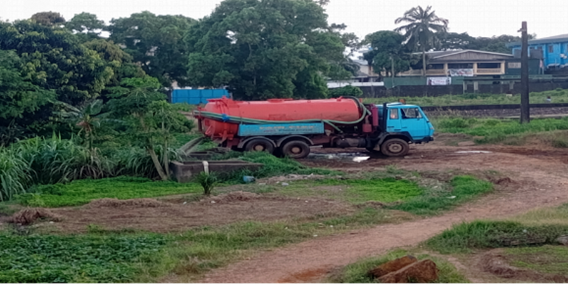The Fiamah community, situated on the outskirts of Monrovia, Liberia, is grappling with a severe environmental and public health crisis stemming from the dilapidated state of the Liberia Water and Sewer Corporation’s (LWSC) Sewage Treatment Plant (STP). Originally intended to protect the city’s residents and environment, the STP has, due to years of neglect and underinvestment, become a source of pollution, contaminating wetlands, waterways, and surrounding neighborhoods. The decaying infrastructure, including malfunctioning filtration systems, allows untreated sewage to leak directly into the environment, posing significant health risks to the community. This pollution is exacerbated during the rainy season, spreading contaminated water further into residential areas, including streets, yards, and local markets.
Compounding this environmental disaster is the alleged practice of the LWSC accepting fees from commercial vacuum truck operators in exchange for permitting them to discharge untreated sewage into open lagoons near the treatment plant. This practice, which reportedly involves daily payments from numerous trucks, directly contravenes Liberia’s environmental protection laws and further jeopardizes the health and well-being of Fiamah residents. Eyewitness accounts from truck drivers corroborate these claims, revealing not only the illicit dumping practice but also the frequent spillage of raw sewage during transport, exposing passersby to hazardous waste.
The consequences of this environmental negligence are devastating for the community. Residents report a pervasive foul odor, increased skin infections, malaria outbreaks, and suspected water contamination. Their daily lives are plagued by the sight and smell of raw sewage, particularly during rainfall when the waste floods their homes and streets. Community leaders have made repeated appeals to the government and the LWSC for intervention, but their pleas have been met with indifference and even threats of displacement. The residents of Fiamah are trapped in a cycle of environmental degradation and official inaction, their health and dignity compromised by the very institutions tasked with protecting them.
Adding to the complexity of the situation is the presence of a primary dumpsite operated by the Monrovia City Corporation (MCC) within the heart of Fiamah. This further contributes to the unsanitary conditions and raises concerns about the overall environmental management within the community. While residents acknowledge the MCC’s attempts at community engagement, they lament the lack of tangible improvements and the persistent health risks they face. Health workers in the area confirm an increase in illnesses consistent with exposure to contaminated water and environments, further highlighting the urgent need for intervention.
The legal framework in Liberia, particularly the Environmental Protection and Management Law (EPML), clearly prohibits the practices observed in Fiamah. However, the LWSC’s actions demonstrate a blatant disregard for these laws and a failure to uphold their responsibility to protect public health and the environment. The Managing Director of the LWSC, while acknowledging the fee collection from commercial trucks, failed to address the core issue of untreated sewage discharge and its violation of environmental law. This lack of accountability and transparency further underscores the institutional apathy plaguing the situation.
Similarly, the Environmental Protection Agency (EPA) has remained unresponsive to inquiries and evidence presented regarding the environmental violations in Fiamah. This lack of action from regulatory bodies further contributes to the sense of abandonment felt by the community and highlights the systemic challenges in enforcing environmental regulations in Liberia. The residents of Fiamah are left to bear the brunt of this environmental and public health crisis, their appeals for help largely ignored by those in positions of authority. The situation demands immediate and decisive action to address the pollution, enforce existing laws, and provide relief to the affected communities.


